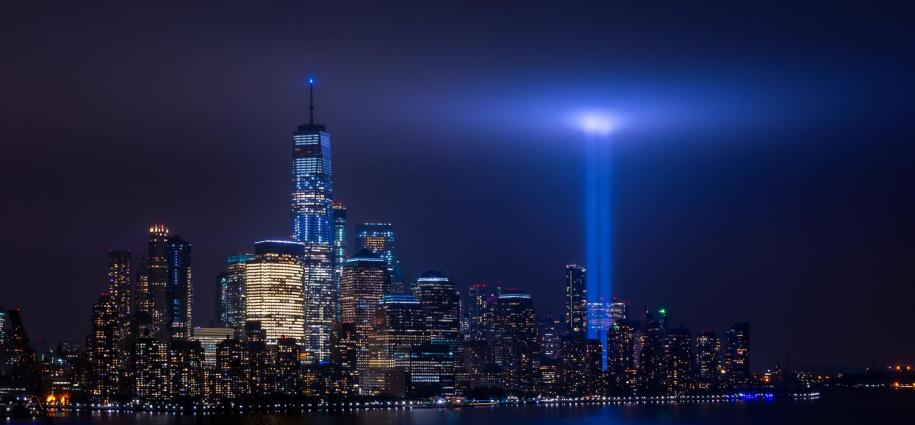
Breadcrumb
- Essential Partners
- Our Impact
- News and Notes
- Searching for Wise Questions, 20 Years Later
Searching for Wise Questions, 20 Years Later
The following reflection was written by Essential Partners co-founder Laura R. Chasin and published on the website of EP, then known as Public Conversations Project. On the eve of the 20th Anniversary of the September 11th attacks, her insights remain as relevant and incisive as ever.

Haunted by unanswerable questions, I have been reminded of an exchange in Elie Wiesel’s Night, his memoir about the Holocaust.
Young Elie’s spiritual master, Moche, tells him that every question possesses a power that does not lie in its answer. “Man raises himself toward God by the questions he asks Him,” Moche explains. He adds that he cannot understand God’s answers. When Wiesel asks him why, then, he prays, Moche replies: “I pray to the God within me that He will give me the strength to ask Him the right questions.”
As the casualties are numbered and named, I am adopting Moche’s prayer. I pray that God—or whatever we call that which encircles and roots our humanity—will give us the strength and wisdom to ask one another the right questions.
Why would one pray for such strength? Why are questions so important?
My experience conducting dialogues among those who have fierce differences about issues such as abortion and homosexuality has made me aware that questions have impact even before they are answered. They can close a door or turn on a light. They can intensify conflict or deepen mutual understanding. Asking the right questions now could build bridges across old divides and prevent the digging of new trenches at a time when we can ill afford further damage to our national landscape.
Questions have unsung power. They focus our attention: “What was your first reaction?” They call upon one dimension of us rather than another: “How are you trying to reassure your children?” They can point us toward a path of understanding and action: “Are there legitimate reasons for people to hate this country?”
Every question harbors an assumption that is often hidden. “How can we get even?” states more than it asks. By answering a question, most of us unwittingly support its hidden assumptions.
Since the terrible destruction of September 11, we have been barraged by questions of all kinds. Questions that seek facts or reassurance. Dread-filled questions that shuffle, half formed, through the dark hallways of our minds: “Why?” and “What will become of us now?”
What are the right questions for these harrowing times? To me, they are questions that promote recovery, minimize risks, and strengthen us for the marathon that lies ahead. They are questions that can galvanize our loyalty to our precious, if flawed, nation— without accelerating a worldwide spiral of violence that becomes even more catastrophic than the events of September 11.
As our nation plans its response, it will matter greatly which questions we choose to address. It will matter whether we ask, “Who is to blame?” or “How can we prevent this from happening again?”
It will matter whether we ask, “What makes them so heartless?” or “What lies at the roots of terrorism?” It will matter whether we ask, “How can I avoid having any contact with Muslims?” or “How can I avoid discriminating against Muslims?”
If, over time, our new sense of solidarity fades, politicians and advocates will have to decide whether to return to politics as usual or to continue reaching across old and deep divides. It will matter whether they ask themselves, “How can I turn this disaster to my political advantage?” or “How can I restrain myself from dehumanizing my opponents and polarizing the public?”
Our views about how to respond to the attack already diverge. How can we openly discuss these differences without engendering the distrust, bitterness and violence of the Viet Nam era?
When covering these public conversations, it will matter if journalists restrain themselves from asking questions that invite leaders to utter simplistic and inflammatory soundbites. One heartening question I have heard often during these frightening and sorrowful days is: “How can I help?” Some have gone to New York to clear away the wreckage bucket by bucket. I urge that the rest of us, wherever we are, address some of our heartbreak and shattered sense of security by rebuilding—question by question.
We can notice the impact on ourselves and others of the questions we hear or read. We can be thoughtful about the purposes of the questions we ask. We can avoid using rhetorical questions. We can decline to answer questions likely to steer talk in destructive directions.
At this time of great peril, I pray to the God within us that He will give us the strength to resist grasping for simple “answers.” I pray that we instead have the courage to participate in conversations focused on the right questions—the most constructive and catalytic questions we can ask.